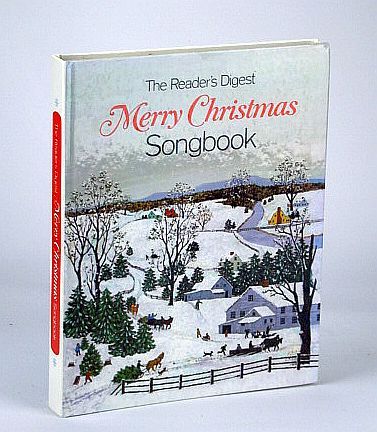Along with the many Christmas albums I grew up with were some songbooks – many odd little slender volumes containing a dozen or so carols, plus the big one: the Reader’s Digest Merry Christmas Songbook.
You see, somewhere along the way, the good folks at Reader’s Digest decided to put together songbooks, and my folks bought them all. They also bought those big box set album sets full of music moods, and at least one collection of the Boston Pops, Arthur Fiedler conducting. Anyway, the songbooks were great, because although they were hardcover, they were also spiral bound, so they could sit on a piano or music stand easily. We still have a few of them – I know I can put my hands on the Christmas one, and the Family songbook, and I think Best Loved Songs.
As a child, I’d pore over these songbooks, and in some cases make up tunes to go with the ones I didn’t know. (This is before I learned how to read music.) Because I’d never heard the Huron Carol before, this one got the Little Kim Makes It Up treatment. I don’t remember the tune I used to sing to it, but I know that the first time I heard the real tune it startled me because mine was so utterly and completely different. (I had a similar experience with “Frankie and Johnny” – it took a long time for me to get my version out of my head for good.)
And the truth is, I’m still largely unfamiliar with this carol, as it’s just never made it onto any of the Christmas music collections I’ve ever owned, and somehow I have never sung it in a choir. (But God forbid we go a year and not sing some crazy version of Jingle Bells – because that’s where Christmas is at, lemme tell ya….)
Anyway, this is a sweet hymn, and according to Wikipedia, was “written in 1643 by Jean de Brébeuf, a Jesuit missionary at Sainte-Marie Among the Hurons in Canada. Brébeuf wrote the lyrics in the native language of the Huron/Wendat people; the song’s original Huron title is “Jesous Ahatonhia” (“Jesus, he is born”).” The English lyrics were written by Jesse Edgar Middletownwith (how’s that for a name?) in 1926. The tune’s origins are less clear, but I’ve seen it connected to French, Breton, and Welsh, so we’ll say … European.
‘Twas in the moon of wintertime, when all the birds had fled,
that mighty Gitchi Manitou sent angel choirs instead;
before their light the stars grew dim, and wondering hunters heard the hymn:
Jesous Ahatonhia, Jesous Ahatonhia.Within a lodge of broken bark the tender babe was found,
a ragged robe of rabbit skin enwrapped his beauty round;
but as the hunter braves drew nigh, the angel song rang long and high:
Jesous Ahatonhia, Jesous Ahatonhia.
Since I am unfamiliar with this, I ran over to YouTube to find a version to listen and sing to, and I came across this gorgeous version by the Cambridge Singers:
Of odd note, however, is the uses of Gitchi Manitou” – an Algonquin name for god – in this Wendat carol. I don’t know if that happened in the English translation, or if there was already some intermixing of languages due to French missionary influences. Anyway, it’s an interesting note.
It’s also of note that this song reflects the tried and true “adopt and adapt” method of conversion; over and over again throughout history we see the incoming (sometimes invading) priests using local metaphors and sacred stories to tell the Christian story, so that the people they’re trying to convert (and sometimes subjugate) would find it easy to make the leap from their deeply held beliefs to include a new one, Christianity. Thus, in this carol, the babe is born “in a lodge of broken bark” and the “chiefs from afar” bring gifts of “fox and beaver pelts.”
And with that, I’ll take my leave of today’s post… the high temperatures have broken, I am at my sister’s for a few days before I head to General Assembly, and I am ready to relax a bit in the early summer cool. I just might flip through a couple of those old songbooks, and maybe make up a tune or two.

